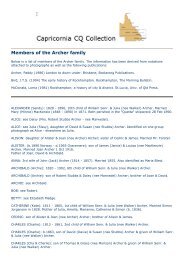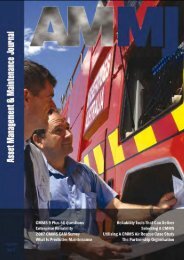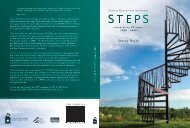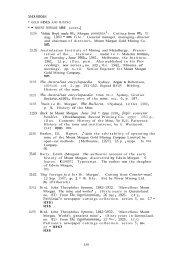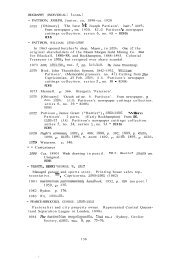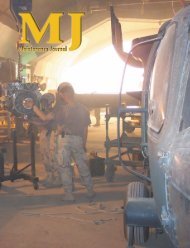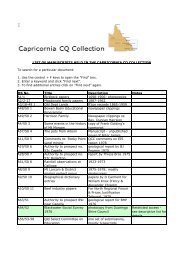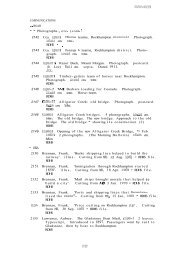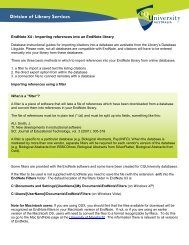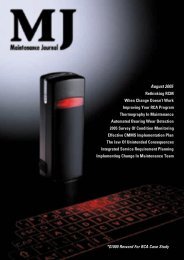May - Library
May - Library
May - Library
You also want an ePaper? Increase the reach of your titles
YUMPU automatically turns print PDFs into web optimized ePapers that Google loves.
Separately Bookable Post-Conference Workshops<br />
Wednesday, 23 June 2004 ◆ Eden on the Park, Melbourne<br />
To ensure you get maximum benefit from attendance at this event, register a team to cover all workshops.<br />
Special platinum workshop upgrades are available for additional delegates - see back page for details.<br />
MORNING<br />
WORKSHOP A: 9.00AM - 12.30PM<br />
HOW TO PLAN AN EFFECTIVE<br />
SHUTDOWN: A STEP-BY-STEP APPROACH<br />
TO PLANNING AND SCHEDULING<br />
A well planned and executed shutdown requires a comprehensive<br />
approach to ensure all shutdown targets are met. A step-by-step<br />
approach is essential to maintain reliability and availibility of your plant.<br />
The emphasis in this hands-on workshop will be on a simple,<br />
pragmatic and practical approach to planning and scheduling.<br />
You will be introduced to the most up-to-date best practice<br />
approaches to planning and scheduling an efficient shutdown. In<br />
particular, you will learn how to:<br />
Identify work scope<br />
Plan and schedule - maintenance history and data analysis<br />
Come in on budget through effective planning and scheduling<br />
Conduct pre and post shutdown analysis<br />
Schedule critical activity planning<br />
Incorporate condition monitoring as a preventative tool<br />
Factor safety and OH&S measures to minimise risk<br />
ABOUT YOUR WORKSHOP LEADERS:<br />
Ian Blair, Senior Consultant and Director of Advanced Business<br />
Management Group (ABMG), has been working as a consultant<br />
implementing manufacturing and telecommunications systems for the past<br />
20 years. His consulting work has been in strategic planning using activitybased<br />
costing and performance management as tools for monitoring and<br />
rewarding performance. Peter Robinson, Managing Director, Daedalus<br />
Compass (London and Melbourne), is an engineer economist of<br />
international repute. He is the Founding Chairman and was Public Officer<br />
of the Maintenance Engineering Society of Australia. His vast experience<br />
includes a range of disciplines and hands-on practice in infrastructure<br />
maintenance, support systems and sourcing contracts.<br />
AFTERNOON<br />
WORKSHOP C: 1.30PM - 5.00PM<br />
HOW TO USE RISK-BASED ASSESSMENT<br />
FOR SHUTDOWN SCOPE PREPARATION<br />
As owners of plants, risk management of assets is something you do<br />
as part of your day-to-day business, regardless of whether you are<br />
the CEO, the plant engineer or a maintenance technician. A riskbased<br />
assessment (RBA) approach to management of assets<br />
systemises this thinking and doing action into a formal, logical and<br />
auditable process. Through this workshop you will learn how riskbased<br />
management is as much about managing people and<br />
processes as it is about managing assets. In particular, you will<br />
expore:<br />
Introduction to RBA methodology<br />
Aligning shutdown scope of work and business risk<br />
Utilising RBA as a prioritising and planning tool<br />
Lighting damage mechanisms and avoiding serious business<br />
impact failures<br />
ABOUT YOUR WORKSHOP LEADER:<br />
David Keen, Managing Director, Plant Reliability Solutions, is a<br />
metallurgist with extensive experience in materials performance,<br />
risk-based assessment and process plant reliability management.<br />
David’s experience includes completing risk based assessments on<br />
more than twenty process plants and power utility facilities in<br />
Australia, New Zealand and Indonesia, implementing reliability<br />
improvement programs on process plants and numerous plant failure<br />
investigations.<br />
LUNCH<br />
MORNING<br />
WORKSHOP B: 9.00AM - 12.30PM<br />
HOW TO AVOID REACTIVE MAINTENANCE<br />
BY CONDUCTING ROOT CAUSE ANALYSIS<br />
Learn how to use this essential and comprehensive root cause<br />
analysis tool to provide your organisation with an effective,<br />
systematic and consistent process for individuals and teams to use.<br />
Also, cover how to then take it further to enable your organisation to<br />
record and report outcomes and where appropriate, to communicate<br />
outcomes with customers, suppliers, alliance partners and regulatory<br />
authorities.<br />
In particular, you will learn how to:<br />
Gather and evaluate the data necessary for analysis<br />
Introduce practical, visual tools to find pattern trends and linkages<br />
Build cause trees that effectively display the range of potential<br />
causes and based on evidence, select the root cause and<br />
therefore the change to be implemented<br />
Participants will be provided with a structured approach for<br />
analysis and explore creative and constructive solutions. Handson<br />
exercises will be used throughout the workshop to develop the<br />
necessary skills at various stages.<br />
ABOUT YOUR WORKSHOP LEADER:<br />
Bill Holmes, Director, SIRF Roundtables, is a mechanical<br />
engineer specialising in the maintenance of industrial plants. He has<br />
facilitated the Industrial Maintenance Roundtable since 1994. The<br />
Roundtable brings together seventy of Australia's largest<br />
manufacturing and mining organisations to compare practices in<br />
delivering highly reliable plants at the lowest cost. In this role he has<br />
participated in more than 130 formal benchmarking studies on five<br />
continents and coaches the evaluation team for the Australian<br />
Maintenance Excellence Awards.<br />
AFTERNOON<br />
WORKSHOP D: 1.30PM - 5.00PM<br />
HOW TO IMPROVE RELIABILITY<br />
THROUGH FAST MAINTENANCE AND<br />
FAILURE ANALYSIS TOOLS<br />
The activity of defining and reviewing a maintenance program is one that<br />
is generally poorly done. Not surprisingly, if done properly, this process<br />
alone can be the most effective means of generating company profits<br />
through greater output from the same assets.Through this workshop<br />
you will learn how this revolutionary PMoptimisation methodology<br />
is improving the effectiveness of maintenance programs and<br />
strategies. In particular, you will walk away knowing how to:<br />
Understand the nine steps of PMoptimisation (PMO)<br />
Decide where to use RCM and where to use PMO<br />
Cope with poor failure history<br />
In addition, you will work through a case study so you can learn<br />
how the process works in a typical environment.<br />
Bring along your own problems for evaluation<br />
Round off the day with a discussion on implementation issues<br />
relative to your own organisation<br />
ABOUT YOUR WORKSHOP LEADER:<br />
Steve Turner, Director, OMCS International, is a professional<br />
engineer and with his colleagues has developed a reliability assurance<br />
program known as PMO2000. Since its beginning nearly seven years<br />
ago, this program has been adopted in over seventy sites across<br />
the globe and has positioned itself as a practical approach that<br />
produces lasting results quickly and effectively. Steve and his licensees<br />
have trained over 3,000 people in three languages across the globe.<br />
Call (02) 9223 2600 To Register Or (02) 9229 1024 To Exhibit



